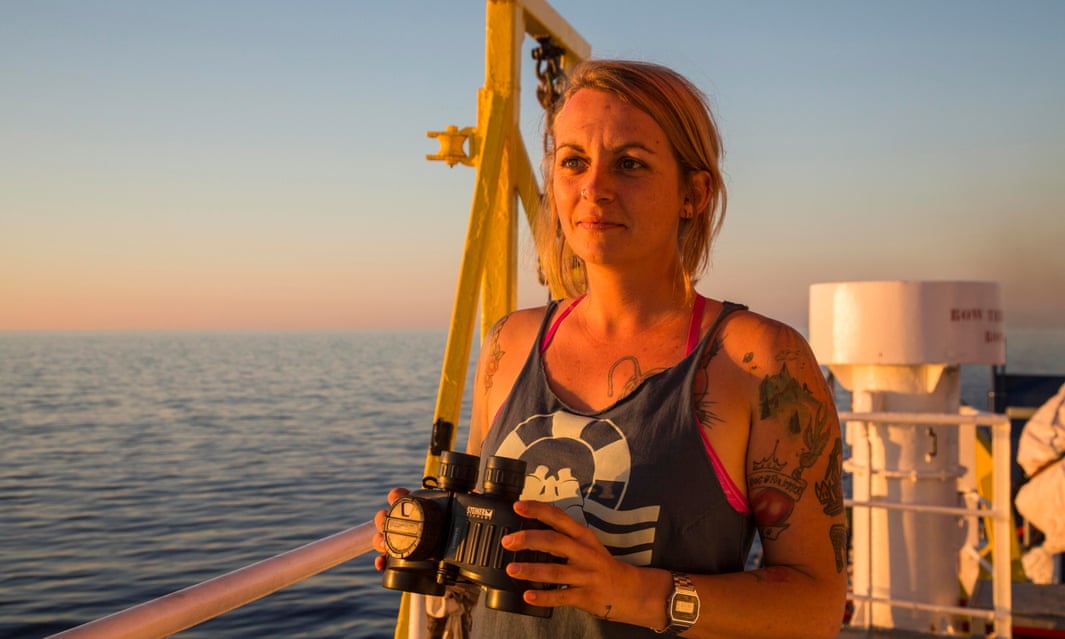You are here
O captain, my captain: sailors who risk jail to save migrants' lives
O captain, my captain: sailors who risk jail to save migrants' lives
Lorenzo Tondo 5 Jul 2019 https://www.theguardian.com/world/2019/jul/05/o-captain-my-captain-sailo...
Pia Klemp, the Iuventa ship captain, is facing up to 20 years in prison for saving 6,000 people from drowning in the Mediterranean. Photograph: Lisa Hoffmann
Carola Rackete is latest in string of rescue ship captains who challenge Italy’s closed-port policy
Carola Rackete is not the only captain to have clashed with the Italian authorities in recent years while attempting to rescue migrants in the Mediterranean.
The case of Rackete – whom a judge eventually released from house arrest last Tuesday – closely resembles that of a German captain, Stefan Schmidt, who, 15 years earlier, was in command of the NGO ship Cap Anamur.
In June 2004, Schimdt and his crew had located a sinking raft carrying 37 migrants. “We saved all of them,” Schmidt said, “but the Italian authorities, as happened with Carola, forbade us to continue navigating towards their coasts.”
The authorities suggested Schmidt take the migrants to Germany, since his ship was flying the German flag.
“It was madness and they left us stranded at sea for 21 days,” he said. “Only then did they dock us, at Porto Empedocle [in Sicily].”
Schmidt was arrested and spent five days in prison, becoming the first captain of a rescue ship to end up in jail for bringing migrants to Italy.
“When I saw the images of Carola being escorted by police officers after she had forced the blockade and landed the migrants, I thought, I’ve been there before,” he said. “I was there 15 years before.
“Carola simply did what a captain must do, when at some point, in the mind of a true captain, something is triggered and we set aside our own lives to save others.”
Schmidt was released from prison but was tried for aiding illegal immigration.
“I tried repeatedly to explain to the magistrates that the law was on my side,” he said. “But then you realise that the law, the codes and the rules do not count in these situations. For them it’s just a political issue.”
The trial lasted almost five years. Schmidt was acquitted in 2009.
The case of Pia Klemp, however, is still a long way from resolution.
Another German captain of a search-and-rescue ship, Klemp, 35, is potentially facing up to 20 years in prison over her role in saving 6,000 people from drowning in the Mediterranean.
At the beginning of 2017, the Italian government railed against the large numbers of people being rescued and brought to their ports, and the lack of support from the EU’s other 27 member states. A deal was agreed with the Libyan coastguard in which the EU would fund their operations to find and return those in the Mediterranean to Libya.
In August 2017, the ship Iuventa was seized at the port of Lampedusa and phones and computers onboard were taken. It later transpired the crew had been bugged and informants had been placed on other rescue ships.
“There is no way I am going to prison for saving people in distress,” Klemp said. “And when I read the news about Carola, I wish I could say I was surprised, but I wasn’t.
“Carola is yet another captain who has tried to break through the wall of the European fortress erected to stop migrants. Her gesture made her fall into a political game. But I’m proud of her, I’m proud of what she and her crew did. When you’re at sea, you know very well you have plenty of time to think about the legal consequences of your decisions. You think about it, but those thoughts do not affect your decision, which a captain has already consciously taken: to save lives and bring them to the nearest safe harbour.”
A year later, in March 2018, the same fate befell Marc Reig, a Spanish captain and head of the Spanish charity Proactiva Open Arms.
Reig, 43, and his crew had just rescued 218 people off the coast of Libya, when they saw a Libyan coastguard ship approaching. The Italian authorities called the Open Arms’ crew and advised them to leave the migrants to the Libyans. The Libyans warned Marc and his crew that if they did not hand the people on board back over, they would open fire.
“At that precise moment I thought about the dozens of empty boats we had found at sea, in recent months,” said Reig. “The migrants, who were on board, had been captured by the Libyans and deported back to Tripoli. The refugees we saved spoke of unimaginable torture. They said they would rather die than go back to Libya.”
With Libyan rifles pointed at his crew, Reig turned north, towards Sicily. But when his ship docked in Pozzallo, in Sicily, dozens of police closed in. As soon as the migrants disembarked, the ship was seized and three members of its crew were put under investigation. The ship was only released a month later.
“The problem is that today the main European countries are more concerned with protecting their borders than people’s lives, and Italy is a very clear example of this,” he said. “When I heard about Carola and her arrest, I immediately thought it would be a long, drawn-out process, as it was for me.”
The investigation of his crew did not stop Reig, who returned to sea to save lives after just a few weeks. Prosecutors dropped all charges against him.
That same summer, however, Matteo Salvini was appointed interior minister, introducing a law that closed the ports to rescue boats and threatened those who broke it with fines of up to €50,000 (£44,800) and the impounding of their vessels.
This was the law Rackete challenged when she brought 42 people to safety.

